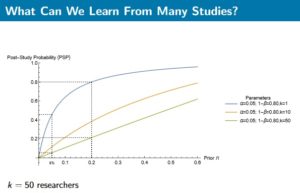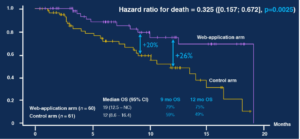Quaterly compendium of biosciences industry perspectives, Q4 2018 , January 2019
Are most research findings false ?
« In a recent presentation, Prof. Victor Gay shows why most research findings might actually be false. Indeed, with a Bayesian approach to knowledge, the mechanics underlying statistical inference implies that as soon as several teams of researchers work on the same problem, the rate of false positives soars relative to the rate of true positives. As a result, the post-study probability—or the probability that a research finding is true—vanishes (see figure). Not all is lost however, as replication might just be the remedy to the crisis of confidence of scientific research.
(presentation available : Improving science findings robustness).

Weak signals regarding innovation for mobile apps in healthcare.
A recent presentation within the Belvedere network shows that regulation is adapting to new trends concerning apps in healthcare. FDA is adopting technology in the field of treatment compliance and diagnostic. The talk shows that an app led to 7 months of progression free survival improvement in oncology (see figure). This monitoring tool seems to preclude adverse reactions and enables relevant dosing for classical treatment. The presentation shows as well the miniaturization of diagnostic tools.
(presentation available : New trends regarding health apps and AI ).

Le Belvédère, January 3rd 2019
